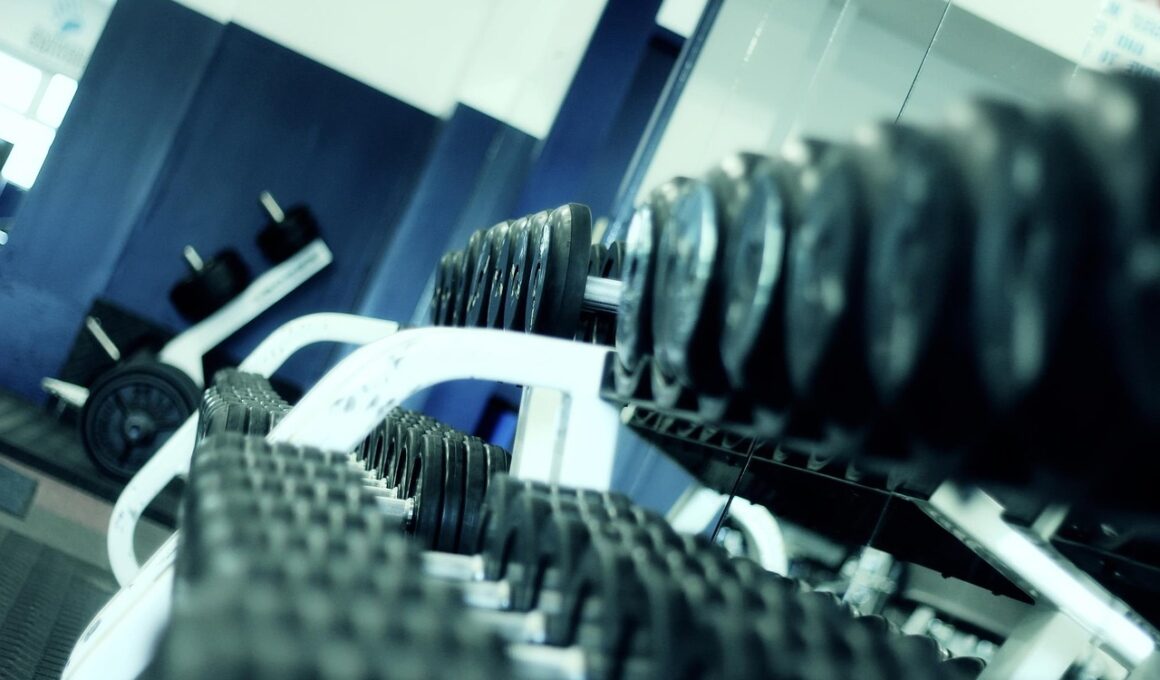Supplements for Joint Health and Injury Prevention in Sports
Joint health is a vital consideration for athletes engaged in various sports. Supplements play a significant role in promoting joint health and preventing injuries. A well-balanced diet complemented by effective supplements can ensure optimal performance and resilience. Among the commonly used supplements are glucosamine and chondroitin. These compounds work together to support cartilage health and reduce joint pain caused by wear and tear. Another vital supplement is omega-3 fatty acids, known for their anti-inflammatory properties. Omega-3s can aid in reducing soreness post-exercise and preventing long-term joint issues. Research indicates that collagen supplements can support the integrity of cartilage and connective tissues. This is essential for athletes who frequently put pressure on their joints. Additionally, vitamin D and calcium are crucial for bone health. Maintaining strong bones helps reduce the risk of fractures. It’s advisable for athletes to incorporate these beneficial supplements into their routine. However, they should consult with a healthcare professional before starting any supplement regimen. This ensures both effectiveness and safety, thus optimizing athletic performance while safeguarding joint health.
Understanding the most effective supplements is crucial for athletes aiming to bolster their joint health proactively. One of the top contenders is turmeric, a powerful anti-inflammatory herb. Curcumin, the active ingredient in turmeric, has been studied for its potential to alleviate joint pain and enhance mobility. Research indicates that athletes can experience less discomfort using turmeric supplements. Another beneficial supplement is Boswellia serrata, also known as Indian frankincense. Boswellia is praised for its ability to inhibit the synthesis of inflammatory chemicals. This can substantially contribute to joint health, especially during intense training periods. Furthermore, antioxidants such as vitamin C and E play a vital role in joint health by reducing oxidative stress. Regular intake can help maintain the structural integrity of joints. Adequate hydration is also essential for joint lubrication. Sports drinks or electrolyte solutions may provide hydration with additional nutrients. Some athletes fail to recognize the importance of hydration in overall performance. On the other hand, always prioritize whole foods as supplements should not replace a healthy diet. A dedicated intake of these nutrients ensures an athlete’s joints remain resilient and strong against stressors.
Strategies for Effective Supplement Use
Utilizing supplements effectively requires strategic planning and understanding of individual needs. First, assessing personal health conditions is crucial. Athletes should evaluate their dietary intake and physical demands. This enables tailored supplementation strategies. Many athletes benefit from a comprehensive blood test to identify potential nutrient deficiencies. Professional advice can help design a plan that covers essential vitamins and minerals specific to their requirements. Moreover, timing of supplementation is equally important. Consuming certain nutrients pre- or post-workout can enhance effectiveness. For example, taking protein or collagen after training can aid recovery and muscle repair. Likewise, omega-3s are best taken daily to maintain lasting anti-inflammatory benefits. It’s also essential to monitor how these supplements interact with medications. For instance, high doses of fish oil may increase bleeding risk when combined with blood thinners. Athletes should always communicate openly with healthcare professionals regarding their supplement stack. Lastly, consistency is key. Regular intake translates into better outcomes for joint health and injury prevention. Following a well-rounded regimen can significantly enhance an athlete’s performance, leading to long-lasting benefits in their respective sports.
The role of education in supplement use cannot be overstated. Athletes need to be informed about the specific benefits and potential risks associated with various supplements. Misinformation can lead to adverse reactions or ineffective usage. A good practice includes reading labels and understanding the ingredients, ensuring the absence of harmful substances. For instance, certain unregulated products may contain banned substances, which pose a risk for athletes. Web platforms and verified fitness experts can provide reliable information. In addition, it’s beneficial for athletes to share their experiences and findings with peers, as accumulated knowledge aids collective awareness. Knowledgeable coaches and trainers play a pivotal role in supplement education, guiding athletes in making informed choices. Regular workshops or consultations can empower athletes. Furthermore, monitoring personal progress and adjusting supplement use accordingly can optimize results. Keeping a journal or log of symptoms and performance metrics can illuminate trends over time. This data is invaluable for tweaking any regimen. When athletes feel confident about their choices, their performance can reflect this positivity. Ultimately, a well-informed athlete is better equipped to make decisions enhancing joint health and athletic longevity.
Myths and Misconceptions
Common myths surround sports supplements, particularly regarding their effectiveness. One prevalent misconception is that supplements can entirely replace a healthy diet. In reality, they are meant to enhance a well-rounded nutritional plan. Supplements cannot replicate the diversity of nutrients found in whole foods. Relying exclusively on supplements may lead to additional deficiencies rather than promote health. It’s also incorrect to assume that all supplements are beneficial for everyone. Individual responses can vary based on unique body compositions and health conditions. What works for one athlete may not yield the same results for another. Another myth is that high dosages yield quicker results. Excessive intake of supplements can lead to toxicity and adverse effects. For example, too much vitamin D can cause hypercalcemia. Therefore, moderation and adherence to recommended dosages are crucial. Furthermore, athletes often disregard the cumulative effect of long-term supplementation. Many benefits materialize gradually with consistent use over extended periods. Patience and commitment are essential to observe joint health improvements. Moreover, regular review of one’s regimen and adapting to changes can keep the supplement strategy effective.
Integrating joint health supplements into a broader preventive strategy is crucial for athletes. This holistic approach encompasses physical conditioning, proper nutrition, and mental wellness. Strengthening surrounding muscles can enhance joint stability and alleviate stress during physical activity. Athletes should engage in resistance training to promote muscle growth and development. Flexibility exercises like yoga can improve joint range of motion, reducing the risk of injuries. Combining strength and flexibility training enhances overall joint robustness. Moreover, mental wellness contributes immensely to an athlete’s performance. Techniques like visualization and mindfulness can ease anxiety, enhancing focus during competition. Good mental health can also positively influence how athletes manage pain. Additionally, regular rest and recovery days are just as important as training days. This allows joints to recuperate from the physical demands placed upon them. Enough sleep and stress management play a role in recovery as well. Staying connected with support systems can further enhance resilience during intense training. Lastly, scheduling regular evaluations with sports medicine professionals can offer preventative care insights, ensuring long-term joint health and injury prevention. An integrated approach promises a more resilient and effective athlete.
Conclusion: Best Practices for Athletes
In conclusion, athletes should prioritize joint health through strategic supplementation and a multifaceted approach. Selecting the right supplements tailored to individual needs can make a significant difference in performance and injury prevention. Throughout this process, consulting with healthcare professionals ensures safe practices while achieving desired outcomes. Additionally, staying updated with emerging research can guide athletes in optimizing their supplementation strategies. Sports nutrition is an evolving field, and scientific advancements continually offer new insights into effective practices. Ultimately, adopting balanced diets filled with whole foods, combined with appropriate supplements, will lay a solid foundation for joint health. Remember that every athlete’s body responds differently to various interventions, so maintaining a personalized approach is essential. Monitoring physical responses and adjusting accordingly maximizes the benefits of chosen supplements. In the competitive sports landscape, utilizing best practices is vital for success. Consistency, education, communication with professionals, and regular evaluations contribute significantly toward achieving athletic goals. Athletes who focus on their joint health and preventive strategies enjoy better longevity and performance in their respective sports, leading to a fulfilling athletic journey.
As a reminder, when introducing supplements for joint health, it’s also vital to approach the topic holistically. Education remains crucial, enabling athletes to understand both benefits and risks. Regular discussions with nutrition specialists can ensure the best approach is applied, tailored to the athlete’s unique needs. Moreover, the continuous sharing of knowledge in the athletic community can demystify common myths associated with supplements, gradually improving collective understanding. In every phase, having the most accurate data available empowers athletes, arming them with the ability to make informed choices that ultimately lead to healthier joints and more fruitful athletic outcomes. By emphasizing a proactive stance towards health, athletes will increase their chances of maintaining peak physical condition for longer durations. The engagement of peers and mentors, thorough self-assessment, and a commitment to ongoing learning will be instrumental as well. This blend of personal responsibility and shared support creates an atmosphere conducive to improving athletic performance. Rethinking the relationship with supplements, focusing on evidence-based practices, and spending time in recovery will yield great dividends in the long term. Finally, all guidelines must work together to create a sustainable athletic journey towards enhanced joint health and reduced risk of injuries.


